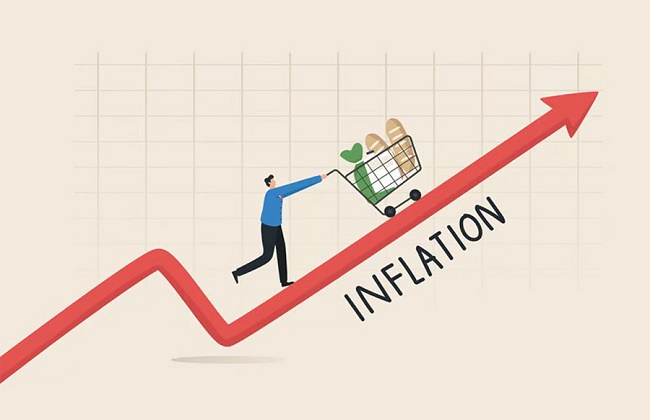
Inflation rocketed 13-year high to 11.66 per cent in July as food cost soared by a steep 14.10 per cent, the toghest month especially for the commoners, the last official disclosure showed.
In a single month, the food inflation on a point-to-point basis surged by 3.68 percentage points to 14.10 per cent from 10.42 per cent in June, according to the Bangladesh Bureau of Statistics (BBS) data unveiled Monday.
The highest inflation was recorded in FY2011-12 when the 12-month moving average was 10.92 per cent, the national statistical body showed.
Middle and lower-middle class and poor people in Bangladesh have faced hardship over more than a year now as the point-to-point inflation was not coming down below 9.0-percent club.
Yet, their livelihood was affected at a higher level in the last month of July when the prices of food-and non-food items were abnormally high.
According to BBS, the point-to-point inflation at the national level in July climbed 1.94 percentage points to 11.66 per cent from 9.72 per cent in June.
The rate of food inflation this time rose higher to 14.10 per cent from 10.42 per cent in June this year.
The non-food inflation also climbed to 9.68 per cent in July from 9.15 per cent in June, the national statistical body showed.
People in the villages are the worst victims of the recent price shocks as the inflation rate in rural Bangladesh crossed the national average in July.
The inflation rate soared to 11.89 per cent in the rural Bangladesh which is significantly higher than the rate in the urban areas as well as in the national level, the BBS data showed.
The food-inflation in villages was recorded at 14.06 per cent in July in a rise from 10.39 per cent in the previous month. The non-food inflation there jumped at a higher rate to 9.84 per cent last month from 9.26 per cent in the previous month.
In the urban areas, the rate of inflation was recorded at 11.27 per cent, 1.69-percentage-point higher than previous month’s. Food inflation was 14.22 per cent in a rise from 10.54 per cent in June. Non-food inflation, however, fell by 1.45 percentage points to 9.43 per cent from 8.98 per cent in June.
Meanwhile, for straight 16 months, Bangladesh failed to tame down inflation below 9.0 per cent for fresh food-price spirals over the last few months, analysts say.
Rather, the inflation in July crossed double-digit level to 11.66 per cent within a single month compared to the below-10-percent rate till June this year.
The higher inflationary pressure has already bit the middle-and lower-middle class and poor people as their expenditure for buying necessary items is eating up the lion’s share of their wags and monthly incomes, they said.
“Lack of governance in the supply system was the key reason for the high prices of the essential items and for the inflationary presses as well,” says one of them.
They are hopeful about the inflation coming down from this month of August as the prices of vegetables and some other essential products have already taken a downturn in retail markets, following the takeover by an interim government.
Meanwhile, the 12-month average of inflation between August 2023 and July 2024 was recorded at 9.90 per cent in the BBS statistics.
In the same period a year ago, the average inflation rate was 9.20 per cent, far higher than the government’s target of 6.5 per cent.
The BBS has also unveiled the Wage Rate Index (WRI) on a point-to-point basis, wherein the rate recorded 7.93 per cent in July.
The July wage rate declined by 0.02 percentage points from 7.95 per cent in the previous month


